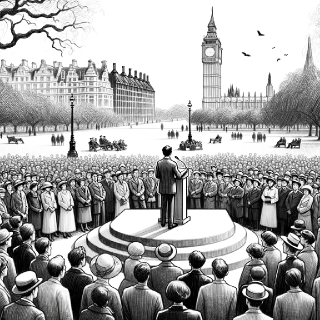
The best predictor of success in life is the ability to postpone gratification for the sake of a more valuable future reward. Accelerate achieving those goals even faster with the proper help.
You know you have to get out for a run. You and your loved ones tell you that you should get your sneakers out and get out. Your doctor said so many times that you should do it, too. Everyone seems to agree: exercise is good for you. Most of all, you know you should get going—now!
But you were working until the late hours of the evening. You are tired. So you think, “Oh well, tomorrow is just as good of a day as any.” So, you don’t go.
Tomorrow evening, just before you were going to put on your running shoes, your old friend calls you, and you talk for an hour. You still could go, but… tomorrow seems like a good plan now.
The next day, the story repeats itself, with a different excuse. Soon enough, months have gone by, you have gained weight, you don’t sleep as well as you used to, and you just feel tired and guilty. And it is already almost Christmas.
German speakers are familiar with the peculiar concept of the “inner schweinehund.” The inner schweinehund does not really exist—it is an imaginary cross-over of a pig (schwein) and dog (hund): a “pigdog.” The inner schweinehund is a similar concept to a scapegoat—a welcome replacement for someone or something that needs to be punished for an unfortunate event or circumstance. Once a scapegoat is identified and dealt with, everybody feels better. Unfortunately, the inner schweinehund won’t make anyone feel better, but, at least, the “inner enemy”—the inner schweinehund—is known, so no further explanation is needed.
Should’ve, would’ve—but didn’t
The inner schweinehund is a problem that urgently needs to be addressed because it may eventually otherwise ruin your life. It is the reason why we go for a quick relief instead of investing more effort to have a far more significant, positive effect on your life. Psychologists confirm that the ability to delay gratification is one of the best indicators of life success. In the famous Stanford University marshmallow experiment (see here), children who were able to withstand the temptation of immediately eating an offered marshmallow were more successful in their later life. Grown-ups have even more options to get distracted: computer games, sex, unhealthy food, online movies, watching meme YouTube videos, alcohol, and other substances—the list is long. Quick “fixes” are easy to obtain. The ramifications include time waste, health problems, emotional issues, relationship disasters, depressions, and missed career opportunities. The “should’ve, would’ve, but didn’t” reflection is a common confession in such cases.
The chart below visualizes the principle of “delayed gratification” and its consequences as a function of time.

In other words, “there is no such thing as a free lunch,” they say, and it is just another common life truism.
Conquer Your Inner Schweinehund
The principle appears simple: set your goals and follow up on them. That, of course, often turns out to be complicated. Life—especially the life of a management or executive professional—can be filled with distractions and obstacles, like in the previous example of forcing yourself to get much-needed exercise. The struggle against the inner schweinehund can be a very lonely and often losing battle. Just “trying really, really hard” is often simply not enough. It also sometimes takes just too many attempts to come up with the right “personal system.” Time is money. Think about it that way: your life is really way too short and precious to be wasted by futile attempts to conquer your inner schweinehund.
Fortunately, there is a smart way to get adequate help. A coach (also called career coach, life coach, or executive coach) can help you formulate, commit to, and execute your personal goals. Hiring a coach is absolutely no reason to feel embarrassed. In football, for instance, a football coach plays a crucial role when it comes to building and sustaining winning teams. In the movie Any Given Sunday, the team coach Tony D’Amato (Al Pacino) delivers a motivational speech before a decisive football game. This speech is absolutely incredible—it still gives me goosebumps every time I watch it. That’s a coach you need: an honest, no-nonsense, life-experienced, well-meaning, and naturally motivating life coach.
It is Not a Zero-Sum Game
As a project manager and management consultant, I was sometimes fortunate to offer personal/professional advice that positively impacted my clients. The outcomes were sometimes impressive, often in both tangible and intangible ways. I have realized that such outcomes turned out to be immensely satisfying experiences to me. It came somehow as a surprise since being happy for another person’s life success doesn’t seem to appear a popular treat. “Why should we help him become successful?” was a comment in a meeting decades ago that I will never forget. Why would he say such a disturbing thing? Maybe he didn’t get the proverbial “memo” from the Universe.
My personal hypothesis is that the law of “delayed gratification” positively correlates with other people’s personal success. On its surface, short-term gains seem immediately gratifying, even—or maybe especially—if it means playing a zero-sum game to the disadvantage of others within your peer group. At second thought, however, allowing or even actively supporting other people’s personal and/or professional forthcoming will likely result in larger, long-term personal gains for you as well. Everyone wins—that may sound somewhat silly, but, nevertheless, it appears worthwhile. In my mind, life is—or, at least, it shouldn’t be—not a zero-sum game. Quite to the contrary: win-win is the “game” I like playing.
One variant of that game involves two people: the coach and the coached. Coaching can be a clever way to outmaneuver your inner schweinehund. Honest feedback, especially in the corporate world, is crucial to make better career decisions. It can be a tricky task to get it, but you bitterly need this feedback, and it is sometimes only possible with the help of a professional career coach.
Hiring a Coach
Hiring a professional/career coach can be a confusing experience, and it is not easy to find the “right” one. The coach’s experience and credentials are just the beginning. Many coaches hold a Ph.D. degree in psychology. However, just like in Any Given Sunday, a coach should have the in-depth, real-life industrial experience to be accepted as a credible life and professional career advisor. A good coach must convincingly demonstrate that he has “skin in the game.” That’s why the team followed the coach in that movie. It is not just a competency contest. Even a top psychologist like Sigmund Freud, however competent he might appear, would not have inspired the team. A similar constraint applies to other industries: technical knowledge, among other coaching skills, is vital.
There are “generic” coaches out there who may be talented enough to help regardless of their industrial experience. They can indeed be helpful, but it is not the point of this article. Instead, a contextually relevant, technology-oriented coach is needed. It should be a credible, industry-aware coach who can help you define and execute a coaching plan—since you do need a plan.
That coaching plan should be part of the coaching process. It should include the following steps:
- Find a credible coach who gives you the impression that your professional career success is of utmost importance.
- Agree upon and sign a coaching contract. It includes the overall purpose, specific conditions, and the fee.
- Jointly review the current situation (as a “baseline”).
- Together agree on measurable goals, milestones, and a review schedule.
- Based on the recurring results, update the plan.
There are several organizations where you can find an accredited coach. For example, the International Coaching Federation can be a good starting point. You might also want to ask a (professional) friend if you can recommend a coach. It may also be helpful to interview several coaches and then decide which of them appears best. The right “chemistry” is hard to define, so listening to your instinct can help you make the right choice.
Furthermore, crucial qualities of a professional coach include absolute discretion, reliability, a fundamentally positive image of a human being, and an ability to actively listen to the person they’re coaching. In general, you want to find a coach who does not treat professional coaching like a regular “job.” If a coach is not passionate about coaching, then continue searching until you find one.
The Future is Bright if You Make It Shine
Having a successful, professional career does not have to be a lucky incident. Instead, it is a skill that can be developed and brought to perfection. Getting help and active support is a smart choice and a fantastic victory in the struggle against your inner schweinehund.
By the way, what success actually means is ultimately up to you. That is often the most critical decision that will define your future, so take your time to do enough soul-searching until you are confident. A good coach will help with that, and the resulting goals may be a good test of the coach’s qualification to deliver personal “added value.”
As a side note, the term “coach” seems to be somewhat overused and appears relatively shallow and uninspiring. Maybe it’s time to come up with a better name for a person whose task is to inspire action and to vigorously encourage the client to make career decisions and to follow up on them consequentially. The popular term “career coach” (and similarly other variants, such as “executive coach,” “life coach,” etc.) appears vague. Maybe a “personal catalyst” would be more appropriate since the presence of a coach should be an accelerator for your life’s forthcoming. A “career catalyst”? It sounds acceptable to me.
Whichever name you prefer, however, is secondary. Make the right decision and initialize the coaching process. Stop procrastinating because there is no time like “now.” Down with the inner schweinehund! You will not miss it. The future is bright if you let it shine.
Let’s start a conversation on LinkedIn or X.com (formerly Twitter).
I am a project manager (Project Manager Professional, PMP), a Project Coach, a management consultant, and a book author. I have worked in the software industry since 1992 and as a manager consultant since 1998. Please visit my United Mentors home page for more details. Contact me on LinkedIn for direct feedback on my articles.




Be the first to comment